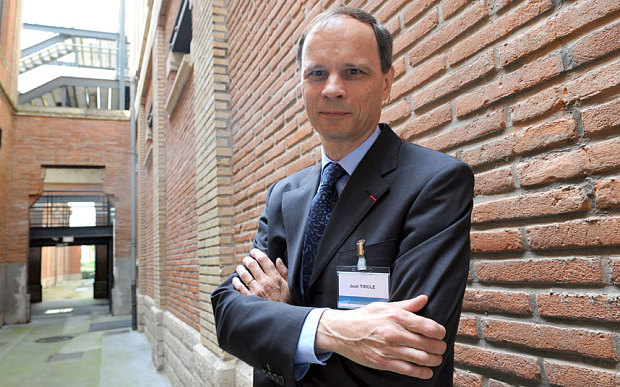October, 14, 2014

Frenchman Jean Tirole of the University of Toulouse won the 2014 Nobel Prize in Economic Sciences for his work on how governments can better regulate industries from banking to telecommunications.
Regulators can use Tirole’s research to encourage powerful companies to become more productive, while preventing them from harming competitors and customers, the Royal Swedish Academy of Sciences said in announcing the award.
“We are affected by big firms all the time,” said Tore Ellingsen, chairman of the judging committee and a professor at the Stockholm School of Economics. “The question is what sort of regulation and competition policies do we want to put in place so that large and mighty firms will act in society’s best interest.”
Tirole is the first Frenchman since 1988 to win the award and the first to be specifically recognized for work on regulation since 1982. The honor comes in the wake of a financial crisis that has been widely blamed on lax oversight of the banking industry.
Speaking by telephone to a press briefing in Stockholm, Tirole said regulation “has to be light enough not to kill entrepreneurship” yet a strong government is needed to enforce it.
Tirole told Bloomberg Television that “strong regulations” are needed to “prevent banks from gambling with taxpayer money.” He commended regulators’ efforts to improve the liquidity of financial firms and limit their trading risks while saying it was too early to tell how effective governments will be in preventing another crisis.
“Banking is a very hard thing to regulate and we economists, academics have to do more work on this,” he said in his briefing.
Tirole “is part of the post-Chicago school of economics,” said Robert Litan, a senior fellow at the Brookings Institution in Washington, referring to the laissez-faire philosophy popularized by the University of Chicago. “He believes that markets don’t always work and worries about how to fix them.”
In particular, the Nobel winner “brought modern game theory tools to the question of how we could improve government regulation,” said Bengt Holmstrom, an economics professor at the Massachusetts Institute of Technology who co-wrote a book with Tirole in 2011 on liquidity in financial markets.
The Frenchman has been a champion of “incentive regulation” that encourages companies to be as efficient as they can while sharing some of the gains they make with consumers, according to Litan, author of “Trillion Dollar Economists: How Economists and Their Ideas Have Transformed Business”
“Jean Tirole is a path-breaking researcher,” James Poterba, president of the National Bureau of Economic Research, which is responsible for dating the beginnings and endings of U.S. recessions, said in an e-mail. “He has had an enormous impact in advancing economic science.”
Bank of France Governor Christian Noyer praised the 61-year-old Tirole’s work, saying he has made “a significant contribution” in helping governments figure out how to supervise the financial services industry after the crisis.
The Nobel winner said he also is studying companies like Google Inc. that work in “two-sided markets,” where they have to attract both advertisers and users of their service. Such markets have a tendency toward monopolization, though that is not dangerous if new competitors are able to enter them, he said.
“The beauty of Tirole’s work is that he has been able to describe deep and essential differences between various industries,” Ellingsen said. “All industries shouldn’t be treated the same.”
The economist said he was surprised to hear that he won the award, adding that his mother was one of the first ones he told about it. “She is 90 years old and I first asked her to sit before I told her,” he said.
Tirole first trained to be an engineer in France and went on to get a doctorate in mathematics from the University Paris-Dauphine in 1978 and a second doctorate in economics from MIT in 1981. He holds honorary doctorate degrees at institutions such as the London Business School and the University of Rome Tor Vergata.
His award led to crowing by both France and MIT.
“Congratulations to Jean Tirole!” boasted French Prime Minister Manuel Valls’ Twitter account. “What a poke in the eye to French bashing.”
MIT publicized Tirole’s prize on its website, saying that the alumnus has “longstanding ties” to the school. Rose said he comes to MIT every fall and spring for a week. “He almost doesn’t sleep. It’s round the clock meetings. People book up to a month in advance,” she said.
The recognition the prize carries has helped previous winners bring their economic theories closer to policy making. Past laureates include Milton Friedman, James Tobin and Friedrich August von Hayek. It also carries an award of 8 million kronor ($1.1 million).
Last year’s award went toEugene F. Fama, Lars Peter Hansen and Robert J. Shiller for their work toward deepening an understanding of how asset prices move.
Annual prizes for achievements in physics, chemistry, medicine, peace and literature were established in the will of Alfred Nobel, the Swedish inventor of dynamite who died in 1896, and the first prizes were handed out in 1901. The economics award was set up by Sweden’s central bank in 1968.
bloomberg
Video Story